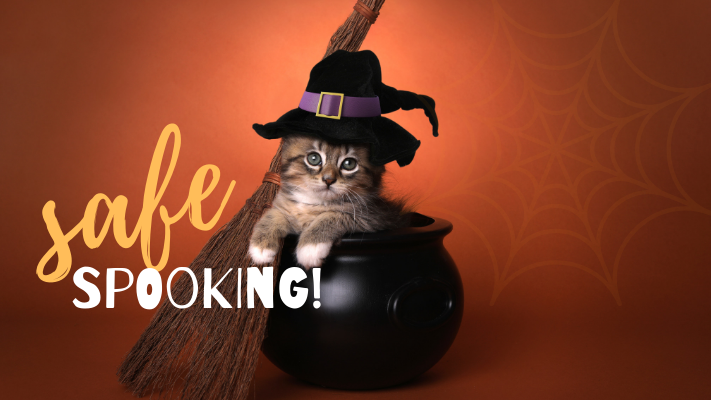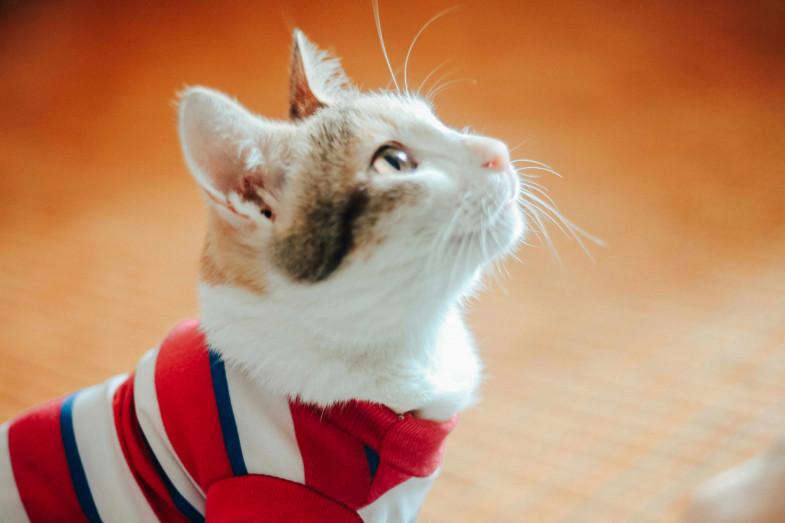Magnolia Veterinary Hospital News
Safe Spooking

Do you have plans for trick-or-treating this month? Parties? Visiting kiddos in creative costumes? As Halloween activities can often stretch through much of October, our Magnolia Veterinary Hospital veterinary staff provides these tips to help keep this fun and spooky holiday safe for furry family members, too! You can help your pet enjoy the season by being mindful of “F.E.A.R.: food, environment, attire and recovery”
Food. Many of the foods associated with Halloween are toxic to pets, especially chocolate and anything sweetened with xylitol. Chocolate contains a chemical called theobromine that is deadly to both dogs and cats and is more concentrated the darker the chocolate is. Xylitol has been proven to be deadly to dogs. The risk to cats is not firmly established, but why chance it? Keep all candy out of reach. If you feel like you’re leaving your pet out of a chance to fully participate in the holiday, we have treats that are safe AND tasty in our clinic!
Environment. Keep all animals inside and provide a safe, stress-free place where they can while away the holiday free of all the commotion and any potential dangers. It is best to walk your dog early in the evening, preferably before the trick-or-treating begins and then retire all pets to their safe haven at least 30 minutes before you expect any trick-or-treaters.
Attire. Know whether your furry friend enjoys participating in the festivities in costume or in his "birthday suit" and let him celebrate accordingly. If he'll be dressing up, make sure the costume does not restrict movement or vision and that there are no loose or small parts that could be ingested.
Recovery. Have a plan in place in case your pet becomes sick or injured this holiday. Our clinic phone number is a good start: 555.555.5555. And it's always a good idea to ensure your pet has up-to-date ID, in the form of a collar and tag and microchip, just in case he gets lost. Our Magnolia Veterinary Hospital veterinarians can easily microchip your pet in a quick and painless appointment, if he’s currently without his permanent ID. Microchips provide the best chance of reuniting with your pet if he or she becomes separated from you. If your pet already has a microchip, be sure to verify that the information on file with the registry is up-to-date; it’s the only way for you and your pet to be reunited.
With a little bit of planning and foresight, you can ensure your Halloween celebrations only spook those they should. Have a safe and happy Halloween!
Image credit: tobkatrina / iStock/ Getty Images Plus
Copyright © 2018 by Uhlig LLC. All rights reserved.
Categories
Recent Posts

When was the last time your pet saw the veterinarian for a checkup, not because they were sick, but just to stay healthy? Preventive care is one of the most important ways to give your pet a longer, happier life. It’s not about doing one big thing. It’s about the small, consistent steps that help avoid bigger health problems later on.

The holidays are full of sparkle, laughter, travel, and to-do lists a mile long. As joyful as this season can be, it often means busier schedules and less time for everyday routines. In the middle of the holiday rush, it's easy to overlook one very important family member: your pet.

If you're lucky enough to have a senior pet, you know just how special that bond becomes over time. From cozy afternoons on the couch to the look in their eyes that says, "I've known you forever," there’s a deep and quiet understanding between you. As pets get older, though, their needs change. Aging isn’t a disease, but it does require us to adapt how we care for our beloved companions.